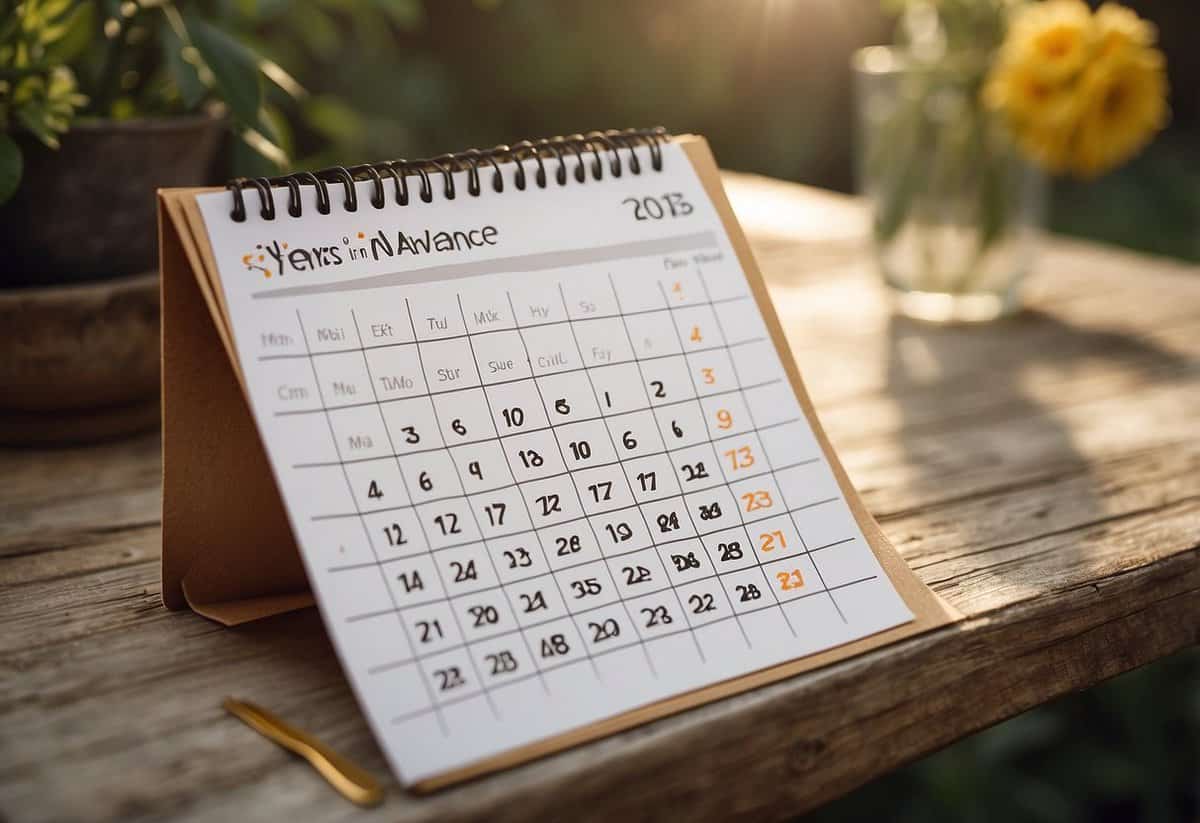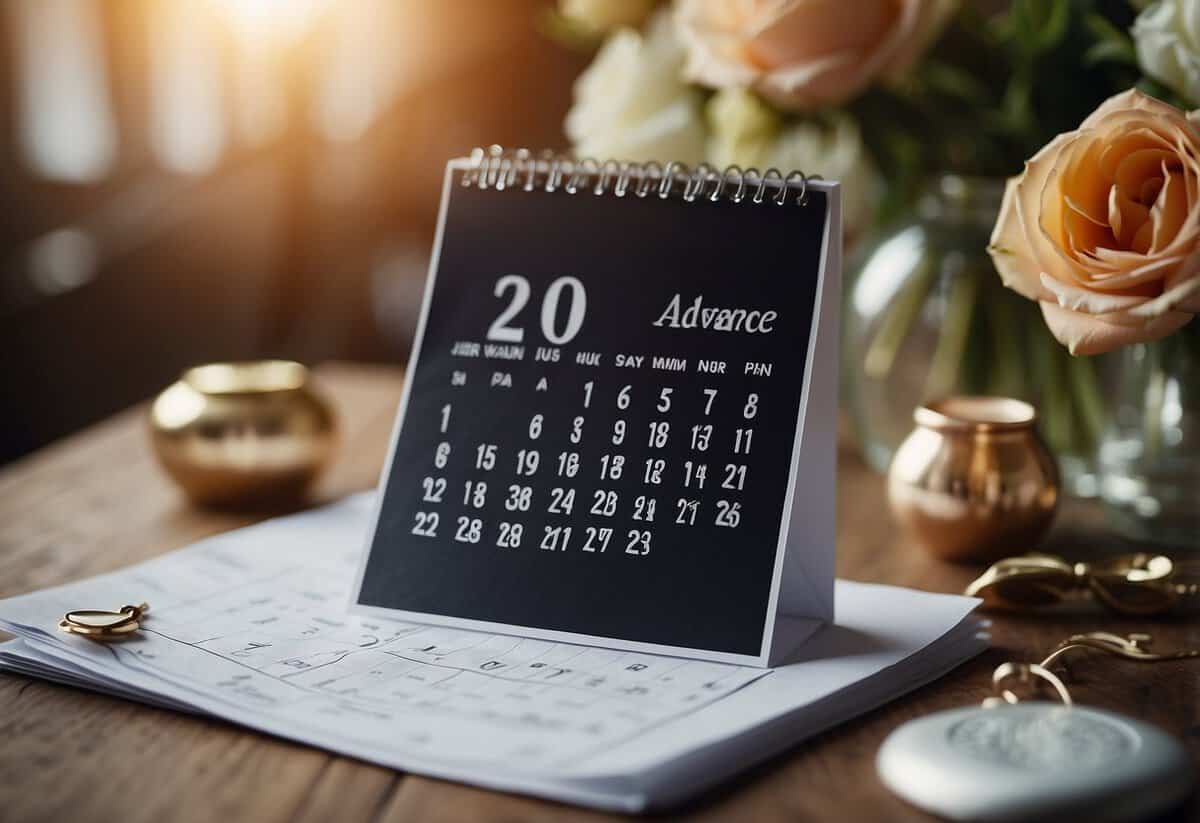Can I Book My Wedding 2 Years in Advance? Tips for Early Planners
Planning a wedding is an exciting time in your life. You might be wondering if you can book your wedding two years in advance. Yes, you can, and it is often recommended to secure your preferred date and venue early.

Booking your wedding two years ahead has many advantages, including better availability of popular venues and vendors. By planning this far in advance, you can avoid the stress of last-minute bookings and have a wider selection of options.
To get started, focus on key aspects like the venue, caterer, and photographer. These tend to get booked quickly, even two years out, making early planning essential. For more tips and advice, check out Viola Warden’s insights and more detailed guidelines on wedding planning timelines.
Understanding the Wedding Planning Timeline

Planning a wedding takes time and careful organization. Knowing key steps and the best times to handle them can ease stress and ensure an enjoyable engagement period.
Components of Wedding Planning
Your wedding planning process involves several critical components. First, decide on your budget. This will guide most of your decisions. Then, choose the date and location early to secure your spot, especially during peak wedding season. Selecting a venue is one of the first and essential tasks.
Communicating with guests is crucial. Sending save-the-dates and formal invitations helps everyone plan ahead. Hiring vendors like caterers, photographers, and florists early will give you the best options. Don’t forget attire fittings for the bridal party, reserving rooms for guests, and arranging transportation.
Ideal Time to Start Planning
Starting a year in advance or more can be very helpful. Many recommend an 18-24 month timeline to give ample time for every detail. Booking too early can sometimes pose challenges, such as trends changing or venues filling up quickly, as noted by Forbes.
Planning early also allows you to enjoy your engagement without feeling rushed. It helps in managing excitement and stress by breaking down tasks into manageable steps. Key activities like venue booking and dress shopping can be done well in advance, while smaller details can be handled closer to the date.
Choosing Your Dream Venue

Choosing your dream wedding venue involves checking the availability of venues, considering popular options, and booking well in advance. This helps you secure your desired date and ensure a smooth planning process.
Evaluating Venue Availability
Evaluating the availability of your dream venue is crucial. Popular venues often have limited availability and may book up to two years in advance. Start by visiting the venue’s website or contacting them directly to check open dates.
Keep in mind that weekends and popular months like June, September, and October can fill up quickly. Some venues might also have waiting lists due to high demand. Acting early can increase your chances of booking that perfect location for your special day.
Popular Venue Considerations
Popular venues often come with unique features and benefits that make them sought after. These could include beautiful landscapes, historical significance, or high-quality service. However, popular venues might also be more expensive and have stricter booking policies.
When considering a popular venue, ask about package deals and what is included. Some venues offer catering and decoration services, while others may require you to hire external vendors. Always visit a few venues to compare options and choose the one that best fits your vision and budget.
Booking Your Venue in Advance
Booking your venue well in advance provides peace of mind and ample time to plan other wedding details. Many top venues recommend booking between twelve to twenty-four months ahead. This is especially important if you have a specific date in mind.
To secure your booking, you may need to pay a deposit. Make sure to review the venue’s cancellation and rescheduling policies, just in case. Early booking also allows you to work more closely with the venue’s staff, ensuring everything meets your expectations.
For specific venues, like those mentioned in Everlasting Occasion’s guide, some couples book as early as three years in advance, particularly for Saturdays in summer months. This highlights the importance of timely action to avoid disappointment.
The Financial Aspects of Weddings

Planning a wedding involves many financial considerations. From setting a realistic budget to understanding the costs of key services like catering and photography, it’s important to manage your spending effectively.
Setting a Wedding Budget
Setting a wedding budget is one of the first steps in planning. You’ll need to consider how much you’re willing to spend and any contributions from family. A good place to start is by listing all possible expenses.
Common budget categories include:
- Venue: Often the largest expense.
- Catering: Prices vary depending on the menu.
- Photography/Videography: Documenting your big day.
- Attire: Wedding dress, tuxedos, and accessories.
- Decor and Flowers: Centerpieces, bouquets, and more.
- Music/Entertainment: DJ or live band.
Allocating funds for each category helps you track and control your spending. Don’t forget to set aside a small portion for unexpected costs that may arise.
Understanding Costs of Key Services
Understanding the costs of key services can help you stay within your budget. Here’s what you can expect:
Venue: The price can vary widely based on location and amenities. Popular venues can cost thousands and may require you to book well in advance, sometimes up to two years before the wedding.
Catering: This is another significant cost. Per-person pricing can range from $50 to $200, depending on the menu and service style (buffet vs. plated dinner).
Photography and Videography: Quality professionals often come at a higher price. You might spend between $2,000 and $5,000 for a combination of both services.
Researching and communicating with your wedding vendors early helps lock in prices and avoid last-minute surprises.
By understanding these essential costs, you can make informed decisions and plan a wedding that fits both your dreams and your budget.
Crafting Your Wedding Experience

When booking your wedding two years in advance, you have ample time to create a personalized and memorable celebration. Focusing on the style of your wedding and ensuring a delightful guest experience are key elements.
Personalizing Your Wedding Style
Your wedding style should reflect your personality as a couple. Think about the overall theme. Are you dreaming of a rustic barn wedding or an elegant ballroom affair? Consider using Pinterest to gather inspiration. Create boards for decorations, floral arrangements, and even wedding invitations.
Choosing your dream venue early allows you to visualize your wedding’s aesthetic. Whether it’s a charming church or a stunning beach, the venue sets the tone for your style.
Think about colors that represent you both. Pick a palette that complements the venue and season. Also, think of the table settings, centerpieces, and even the menu to reflect your chosen theme. Don’t forget about rentals like tables, chairs, and linens to enhance the look.
Managing Guest Experiences
Creating a pleasant experience for your guests starts with thoughtful planning. Begin with a detailed guest list early. This will help in booking enough space and managing the guest count effectively.
Send out wedding invitations well in advance to give everyone plenty of time to prepare, especially out-of-town guests. If you’re planning a destination wedding, early invites are even more crucial.
Think about the day of the week. While Saturdays are popular, they can be more expensive and harder to book. Consider a Friday or Sunday wedding to give guests time to travel.
Lastly, think about the overall guest experience, from accommodations to the food served. Whether it’s arranging transportation or crafting a great menu, these details will ensure your guests have a memorable time.


